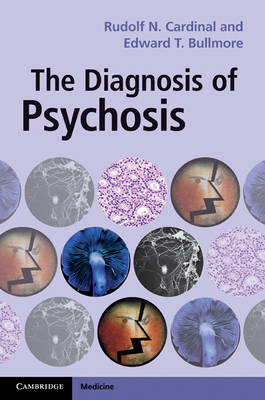
The Diagnosis of Psychosis
Cambridge University Press (Verlag)
978-0-521-16484-9 (ISBN)
Psychosis has many causes. Psychiatrists typically receive the most thorough training in its diagnosis, but the diagnosis of psychosis secondary to nonpsychiatric conditions is not often emphasized. An understanding of the underlying cause of psychosis is important for effective management. The Diagnosis of Psychosis bridges the gap between psychiatry and medicine, providing a comprehensive review of primary and secondary causes of psychosis. It covers both common and rare causes in a clinically focused guide. Useful both for teaching and reference, the text covers physical and mental state examination, describes key investigations, and summarizes the non-psychiatric features of medical conditions causing psychosis. Particularly relevant for psychiatrists and trainees in psychiatry, this volume will also assist neurologists and general physicians who encounter psychosis in their practice.
Rudolf N. Cardinal is Academic Clinical Fellow and Specialty Registrar, Department of Psychiatry, University of Cambridge and Cambridgeshire and Peterborough NHS Foundation Trust. Edward T. Bullmore is Professor of Psychiatry, Department of Psychiatry, University of Cambridge; Clinical Director of the Behavioural and Clinical Neurosciences Institute, Cambridge; and Vice-President of Experimental Medicine and Head of the Clinical Unit, GlaxoSmithKline, Cambridge, UK.
Abbreviations and symbols; Preface; Acknowledgements; Part I. The Causes of Psychosis: 1. Introduction; 2. Methods; 3. Delirium; 4. Neurodevelopmental disorders and chromosomal abnormalities; 5. Neurodegenerative disorders; 6. Focal neurological disease; 7. Malignancy; 8. Infectious and postinfectious syndromes; 9. Endocrine disease; 10. Inborn errors of metabolism; 11. Nutritional deficiency; 12. Other acquired metabolic disorders; 13. Autoimmune rheumatic disorders and vasculitides; 14. Other autoimmune encephalopathies; 15. Poisoning; 16. Sleep disorders; 17. Sensory deprivation and impairment; 18. Miscellaneous; 19. Catatonia; 20. Agitation and bizarre behaviour; 21. Primary psychiatric disease; 22. Factitious disorder and malingering; 23. Multiple simultaneous causes of psychosis, and questions of causality; Part II. A Clinical Approach to the Diagnosis of Psychosis: 24. History and examination; 25. Initial investigations relevant to psychosis; 26. Putting it together: clinical and paraclinical clues; 27. Further investigations relevant to psychosis; 28. Classificatory approach for psychosis of unknown aetiology; 29. Conclusion; 30. Appendices; 31. References; Index.
| Erscheint lt. Verlag | 31.3.2011 |
|---|---|
| Zusatzinfo | Worked examples or Exercises |
| Verlagsort | Cambridge |
| Sprache | englisch |
| Maße | 156 x 234 mm |
| Gewicht | 660 g |
| Themenwelt | Geisteswissenschaften ► Psychologie ► Klinische Psychologie |
| Geisteswissenschaften ► Psychologie ► Psychosen | |
| Medizin / Pharmazie ► Medizinische Fachgebiete ► Neurologie | |
| Medizin / Pharmazie ► Medizinische Fachgebiete ► Psychiatrie / Psychotherapie | |
| Studium ► 2. Studienabschnitt (Klinik) ► Anamnese / Körperliche Untersuchung | |
| Schlagworte | Psychose |
| ISBN-10 | 0-521-16484-2 / 0521164842 |
| ISBN-13 | 978-0-521-16484-9 / 9780521164849 |
| Zustand | Neuware |
| Haben Sie eine Frage zum Produkt? |
aus dem Bereich


